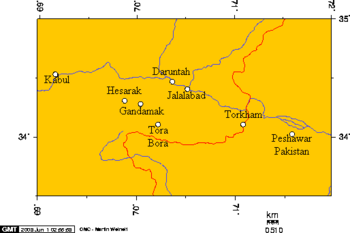Jalalabad: Difference between revisions
imported>Howard C. Berkowitz |
imported>Howard C. Berkowitz |
||
| Line 18: | Line 18: | ||
It has an airport used only for military and United Nations flights. | It has an airport used only for military and United Nations flights. | ||
Jalalabad is northeast of the rugged areas of [[Tora Bora]], which [[al Qaeda]] and [[Taliban]] survivors used as an escape route to Pakistan in 2001-2002. | Jalalabad is northeast of the rugged areas of [[Battle of Tora Bora|Tora Bora]], which [[al Qaeda]] and [[Taliban]] survivors used as an escape route to Pakistan in 2001-2002. | ||
==References== | ==References== | ||
{{reflist}} | {{reflist}} | ||
Revision as of 17:38, 28 May 2009
Jalalabad is the capital of Nangarhar Province, in Afghanistan. It is one of the largest cities in Afghanistan. Its population is primarily of Pashtun ethnicity.
History
Present-day Jalalabad was the major city of the ancient Greco-Buddhist center of Gandhara. Babur, founder of the Moghal empire of India, chose the site for the modern city, which was built c.1570 by his grandson, Akbar. During the First Afghan War, British troops held (1842) Jalalabad against an Afghan siege. [1]
Economics and transportation
The city has a university and medical school. Oranges, rice, and sugarcane grow in the fertile surrounding area, and the city has cane-processing and sugar-refining as well as papermaking industries.
It lies one of the first paved roads, connecting Afghanistan's capital Kabul, with the border crossing at Torkham, and ultimately to Peshawar, Pakistan.
Military
It has an airport used only for military and United Nations flights.
Jalalabad is northeast of the rugged areas of Tora Bora, which al Qaeda and Taliban survivors used as an escape route to Pakistan in 2001-2002.
References
- ↑ , Jalalabad, The Columbia Encyclopedia (Sixth Edition ed.), - 2008
